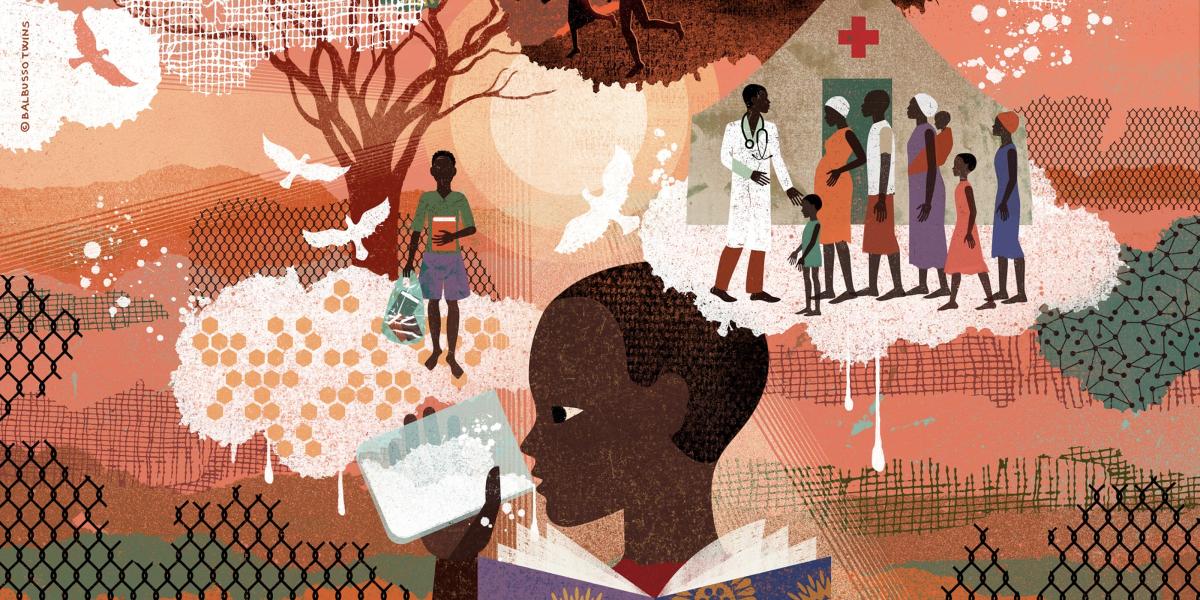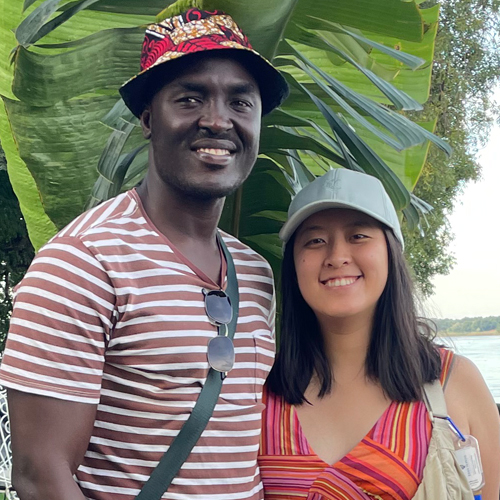A Cup of Milk and a Life Transformed
A South Sudanese refugee finds a home in academics and public health.
I will never forget the first time I tried milk: the creaminess, the sweet smell, the smoothness. I had to have more, and I’d heard that school was the only place you could get milk regularly.
Years before my first taste of milk in a refugee camp, the war in Sudan intensified in 1989, forcing my village to flee for safety. Beneath raining bullets, everyone grabbed what they could and ran. I was only 2 and had to be carried on the backs of my relatives during the five-day journey to reach the Ugandan border. The UN and other organizations provided meals for us and two months later relocated us to a refugee camp, about 400 kilometers away.
The camp would be my home for the next 20 years—and the site of some of my fondest childhood memories, like playing hide and seek around the rows and rows of tents. It’s where I was lured to school by the promise of a daily cup of milk. Classes were under a tree, and we used our fingers to write our lessons in the soil. In 1996, life in the camp became harder and food rations stopped. Sometimes, we only ate food that we could find nearby like mangoes.
My father was not with us. He was a solider and died before I was born. I wonder what he was like—a sweet, loving dad who would play with me and teach me things? Or a strict, formal father who would yell a lot but still watch out for me? I will never know.
In my community, fathers are revered. So I acutely felt his loss and would feel embarrassed when other kids talked about their fathers. I became more and more introverted, channeling my pain into academics.
At 12, I developed a painful swelling on my face, and after waiting in a long line to see a doctor, we learned that he had left and wouldn’t return to the camp until the next week. The experience made me wonder if I could become a doctor so that my family would never have to wait long for help again.
For a time, I attended a boys’ boarding school. It was immediately apparent that I was different from my classmates. I didn’t have a proper backpack or clothes—I had a plastic bag and wore a torn shirt. I was referred to as “a person who ran to get away from trouble,” which was their understanding of refugees. I was bullied regularly, and it landed me in a deep depression.
Academics became my only chance to prove my worth, and I worked twice as hard to show that I belonged. Slowly but surely, I started to make friends. I decided to become a doctor. I was motivated by the lack of medical care in the camp and my deep desire to achieve. An American family paid for my medical education at Gulu University in Uganda. (Thank you, Joe and Lisa!)
I was completing my medical training when Sudan split, and South Sudan became a country. After graduating in 2013, I returned to South Sudan and worked in a local hospital. For once, I felt like I truly belonged.
After I began working for Jhpiego, and later UNICEF, on maternal and newborn health programs, I met a Bloomberg School PhD student doing research on newborns in humanitarian settings. The more I learned about Hopkins, the more skeptical I became that a refugee kid could find a place there. But I gathered my courage and applied to the Bloomberg School’s MSPH program. I received an email that began: “Thank you … we regret …”
I worked hard on my personal essay and applied again. What a joy it was when the congratulations message came from Admissions. I had been awarded the Peter Salama Scholarship, which is designated for a student displaced by conflict.
That poor refugee kid whose first classroom was under a tree went on to study and graduate from the world-renowned Johns Hopkins University. More importantly, I met my future wife in a humanitarian health class at the School. We are happily married now and working in South Sudan in the humanitarian field.
I dream that one day we will have children, and I will be a father who loves and guides them.
And, of course, I will make sure that they always have plenty of milk.

